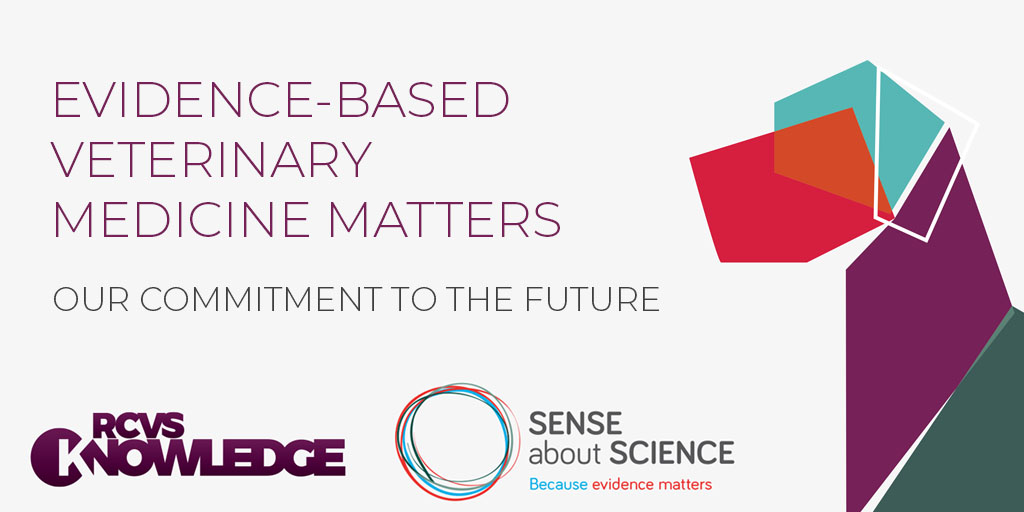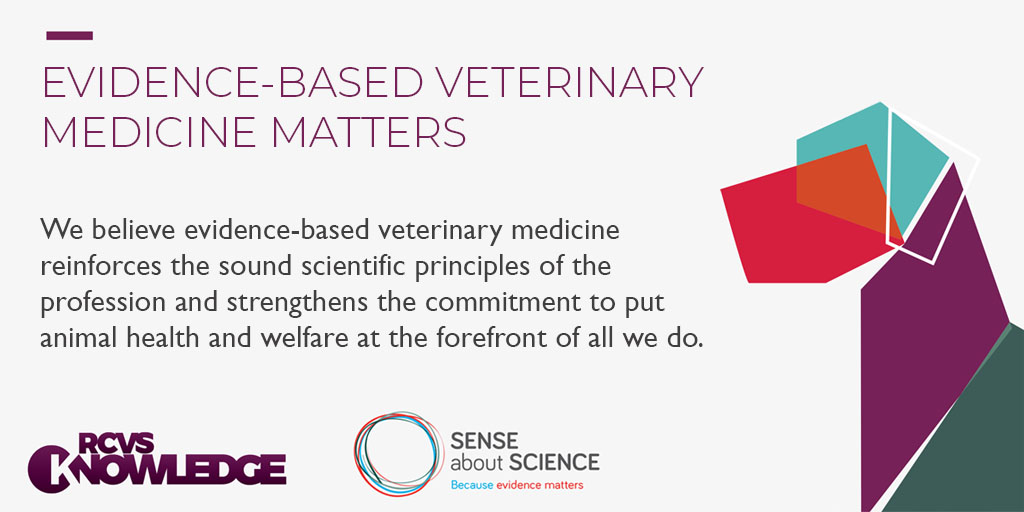Wednesday, 20 November 2019
The University of Nottingham is one of 15 major UK member organisations, vet schools and policy-making bodies, that have come together to affirm their commitment to veterinary medicine based on sound scientific principles, in a new landmark publication produced by RCVS Knowledge and the charity Sense about Science.
Evidence-Based Veterinary Medicine Matters: Our Commitment to the Future represents the first time this broad and influential group have formally united in support of a single issue.
The collaboration is testament to the importance that veterinary organisations across the profession place on the use of evidence to enhance all types of veterinary medicine.
The publication serves to demonstrate the profound and wide-ranging impact that evidence can have – and has had – on animal health and welfare. It also provides a convincing rationale for all veterinary professionals to contribute to the evidence base and put evidence into practice, to the benefit of animals, owners and veterinary teams themselves.
The School of Veterinary Medicine and Science at the University of Nottingham is one of the signatories.
We are delighted to be part of this new initiative. We have a strong commitment to evidence-based medicine embedded throughout our teaching and research, and through our Centre of Evidence-Based Veterinary Medicine. Our work is featured in the British Cattle Veterinary Association landmark story on controlling mastitis in cattle, and the University of Nottingham landmark story on an evidence-based educational campaign on early recognition of colic in the horse.”
 RCVS Knowledge
RCVS Knowledge
The commitment is set in the context of 14 case studies that showcase the impact of standout veterinary research and evidence in the 20th and 21st centuries. Spanning small animal, farm, equine, nursing, animal welfare and agriculture, the case studies show that different types of evidence have been key to major steps forward in veterinary medicine.
The full commitment and portfolio of case studies can be read in Evidence-Based Veterinary Medicine Matters, available for free online.
UK Chief Vet Christine Middlemiss said: “What’s the evidence? An evidence-based approach is vital in all areas of our profession, whatever is keeping you awake at night. For me, it is the threat of African swine fever and avian flu. The evidence I rely on comes from our specialist surveillance monitoring and testing, veterinary epidemiologists and disease modellers. It enables me to make timely, proportionate risk-based decisions that stand up to scrutiny.
“If you are managing veterinary care in practice, the evidence you rely on to underpin your standards of clinical care comes from multiple sources too. Evidence-based veterinary medicine allows us to refine and tailor strategies to be effective and efficient, making full use of existing and new technologies.
“The profession has taken great strides towards embracing evidence-based veterinary medicine and building on this will strengthen the links between clinical decision-making, policy development and future research.”
Chris Gush, Executive Director of RCVS Knowledge, added: “We are impressed by the contributions from our co-signatories, which clearly demonstrate the phenomenal impact on patient outcomes that conducting research and using evidence can have. We are also delighted that Sense about Science, a flagbearer for evidence, transparency and rational thinking, has joined with us to highlight the many benefits EBVM can bring.
 RCVS Knowledge
RCVS Knowledge
“The publication also makes a strong case for much-needed funding for research to grow the evidence base, which would put powerful, robust data into the hands of veterinary professionals as they make critical decisions that can affect patient outcomes.
“It is our hope that the calibre, diversity and sheer number of the organisations putting their name to this commitment will galvanise all vets and their teams to expand their use of evidence in practice.”
Sense about Science is an independent charity that promotes understanding and use of scientific evidence. Rebecca Asher, Deputy Director, said: “This is a showcase of game changers in veterinary care and we hope it will inspire and motivate everyone in the profession.
“We were delighted that RCVS Knowledge approached us to collaborate with them and other leading institutions in the veterinary research community to affirm their commitment to an evidence-based approach to veterinary medicine.
“Everyone expects treatment for humans to be underpinned by evidence. We now expect the same of the whole veterinary community when it comes to the treatment of animals.”
Story credits
More information is available from Professor Sarah Freeman in the School of Veterinary Medicine at sarah.freeman@nottingham.ac.uk
Notes to editors:
About the University of Nottingham
Ranked 97 in the world and 17th in the UK by the QS World University Rankings, the University of Nottingham is a founding member of Russell Group of research-intensive universities. Studying at the University of Nottingham is a life-changing experience, and we pride ourselves on unlocking the potential of our students. We have a pioneering spirit, expressed in the vision of our founder Sir Jesse Boot, which has seen us lead the way in establishing campuses in China and Malaysia - part of a globally connected network of education, research and industrial engagement.
Nottingham was crowned Sports University of the Year by The Times and Sunday Times Good University Guide 2024 – the third time it has been given the honour since 2018 – and by the Daily Mail University Guide 2024.
The university is among the best universities in the UK for the strength of our research, positioned seventh for research power in the UK according to REF 2021. The birthplace of discoveries such as MRI and ibuprofen, our innovations transform lives and tackle global problems such as sustainable food supplies, ending modern slavery, developing greener transport, and reducing reliance on fossil fuels.
The university is a major employer and industry partner - locally and globally - and our graduates are the third most targeted by the UK's top employers, according to The Graduate Market in 2024 report by High Fliers Research. Alongside Nottingham Trent University, we lead the Universities for Nottingham initiative, a pioneering collaboration between the city’s two world-class institutions to improve levels of prosperity, opportunity, sustainability, health and wellbeing for residents in the city and region we are proud to call home. More news…